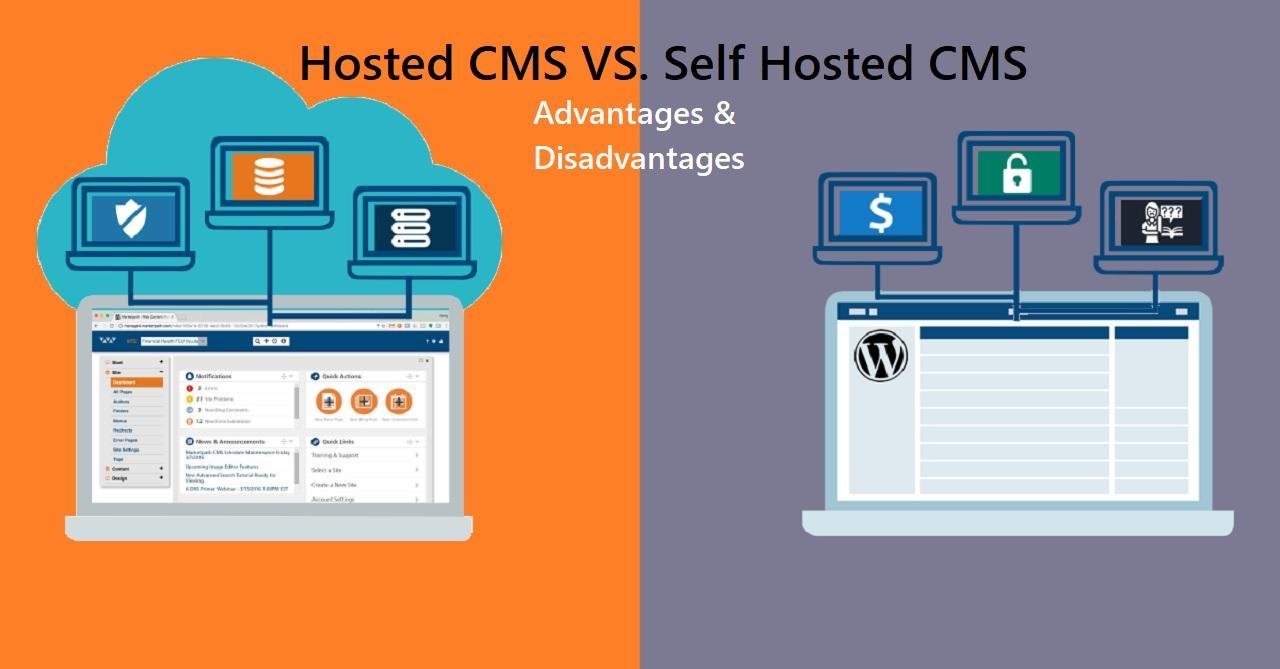Are you torn between choosing a hosted CMS or a self-hosted CMS for your website? Understanding the advantages and disadvantages of each option is crucial in making an informed decision. Hosted content management system platforms offer simplicity, cost-effectiveness, and reliable support, while self-hosted content management system platforms provide customization, control, and data ownership.
To help you make the right choice, this article explores the benefits and drawbacks of both hosted and self-hosted CMS options. Whether you’re a beginner or an experienced website owner, this must-read article will provide valuable insights to guide you toward the content management system solution that best fits your needs.
Hosted Content Management System:
A hosted CMS is a web-based platform that provides a convenient and accessible solution for creating and managing websites. With a hosted CMS, users can quickly set up their websites without the need for extensive technical knowledge or server configurations.
This type of content management system offers numerous advantages, including ease of use, cost-effectiveness, scalability, regular updates, and reliable technical support.
By leveraging the power of a hosted CMS, individuals and businesses can focus on creating and publishing content, while leaving the technical aspects of website management to the hosting provider.
The Advantages

A hosted CMS provides numerous advantages for individuals and businesses seeking an efficient and user-friendly solution for website creation and management.
a. Ease of Setup and Use:
- Provide a user-friendly interface, simplifying the setup and management process for individuals with limited technical expertise.
- Users can quickly get started without worrying about server configurations or software installations, saving time and effort.
b. Cost-Effective Solution:
- Often offer affordable pricing plans that include hosting, maintenance, security, and updates.
- This eliminates the need for separate web hosting and reduces expenses associated with server management, such as hardware costs, IT personnel, and software licenses.
c. Scalability and Flexibility:
- Typically offer scalable infrastructure, allowing websites to handle high traffic volumes without significant performance issues.
- As your website grows, the hosting provider can accommodate increased storage, bandwidth, and resources, ensuring smooth operations.
d. Regular Updates and Security:
- Generally provide automatic updates, ensuring that your website remains secure and up-to-date with the latest features.
- Hosting providers often implement robust security measures, including firewalls, malware detection, and data backups, to protect your website and user data.
e. Hosted CMS Technical Support:
- Often offer dedicated customer support, providing assistance and resolving technical issues promptly.
- Users can rely on the expertise of the hosting provider’s support team to address concerns, allowing them to focus on content creation and website management.
Read Also: Blogger vs WordPress: Which is the ultimate choice for your blogging journey? Explore the pros and cons to make an informed decision.
The Disadvantages

While hosted CMS offers convenience and ease of use, they also come with certain disadvantages to consider.
a. Limited Customization Options:
- May restrict certain customization options, limiting the ability to modify the underlying code or implement complex functionality.
- Users may be limited to the features and templates provided by the platform, which could result in a lack of uniqueness for their website.
b. Dependency on Hosting Provider:
- Website performance, uptime, and security are dependent on the hosting provider.
- If the hosting provider experiences downtime or technical issues, your website may be affected, potentially resulting in lost revenue and a negative user experience.
c. Data Ownership and Portability:
- The website’s data is stored on the hosting provider’s servers, raising concerns about data ownership and control.
- Moving to a different CMS platform or self-hosted solution may require a complicated migration process, potentially resulting in data loss or format compatibility issues.
Read Also: 5 Key Differences to Compare Shared Hosting vs WordPress
Self-Hosted Content Management System:
A self-hosted CMS empowers individuals and organizations with complete control and ownership over their websites. Unlike hosted CMS platforms, a self-hosted CMS requires users to set up their own hosting environment, giving them the flexibility to customize every aspect of their website.
With a self-hosted CMS, users have the freedom to modify the code, implement unique features, and tailor the website to their specific needs. Although it demands technical expertise and maintenance responsibilities, a self-hosted CMS offers advantages such as data ownership, performance optimization, and the ability to switch hosting providers if necessary.
This level of control makes self-hosted CMS platforms a popular choice for those seeking maximum customization and independence in managing their online presence.
The Advantages

A self-hosted CMS offers a range of advantages for individuals and businesses seeking full control and customization over their websites.
a. Full Control and Customization:
- Allow complete control over the website’s code, design, and functionality.
- Users can tailor the CMS to meet their specific requirements, implement custom features, and modify the underlying code as needed.
b. Data Ownership and Portability:
- Retain full ownership and control over your website’s data.
- It becomes easier to migrate your website to a different hosting provider or CMS platform, granting flexibility and ensuring data portability.
c. Performance and Speed Optimization:
- Offer greater control over server configurations, allowing users to optimize performance and speed based on their needs.
- This flexibility can result in faster load times, enhanced user experience, and improved search engine rankings.
d. No Dependency on Hosting Providers:
- Eliminate the risk of being dependent on a specific hosting provider’s uptime or quality of service.
- You have the freedom to switch hosting providers if needed, ensuring optimal website performance and reliability.
The Disadvantages

While a self-hosted CMS offers unparalleled control and customization, it also presents certain disadvantages to consider.
a. Technical Expertise and Maintenance:
- Require technical proficiency for initial setup, server management, and software updates.
- Users should be comfortable with tasks like server configurations, security patches, and troubleshooting to maintain a secure and stable website.
b. Cost Considerations:
- Require separate web hosting, which can result in additional costs compared to hosted CMS solutions that include hosting.
- Users must account for expenses related to web hosting, domain registration, server maintenance, and security measures.
c. Security and Updates:
- The responsibility of ensuring security and applying regular updates rests on the website owner.
- Users must actively monitor and address security vulnerabilities and keep their CMS and plugins up to date to maintain a secure environment.
Conclusion:
In conclusion, the choice between a hosted CMS and a self-hosted CMS ultimately depends on your specific needs and priorities. Hosted CMS platforms offer ease of use, affordability, scalability, and reliable technical support, making them an attractive option for users who value convenience and simplicity. On the other hand, self-hosted CMS platforms provide full control, customization options, and data ownership, allowing for greater flexibility and independence.
Before making a decision, carefully consider the advantages and disadvantages of each option discussed in this article. Assess your technical expertise, budget, customization requirements, and long-term goals for your website. By doing so, you can make an informed choice that aligns with your unique needs.
Now that you have a better understanding of the advantages and disadvantages of hosted and self-hosted CMS solutions, feel free to share this article with others who may also be contemplating the right CMS for their website. Sharing knowledge can help others make informed decisions and navigate the world of CMS more effectively.






